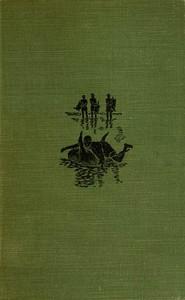Read this ebook for free! No credit card needed, absolutely nothing to pay.
Words: 89860 in 20 pages
This is an ebook sharing website. You can read the uploaded ebooks for free here. No credit cards needed, nothing to pay. If you want to own a digital copy of the ebook, or want to read offline with your favorite ebook-reader, then you can choose to buy and download the ebook.


: The Atlantic Monthly Volume 16 No. 94 August 1865 A Magazine of Literature Art and Politics by Various - American periodicals The Atlantic Monthly
ATLANTIC MONTHLY.
Entered according to Act of Congress, in the year 1865, by TICKNOR AND FIELDS, in the Clerk's Office of the District Court of the District of Massachusetts.
AMONG THE HONEY-MAKERS.
The luxury of all summer's sweet sensation is to be found when one lies at length in the warm, fragrant grass, soaked with sunshine, aware of regions of blossoming clover and of a high heaven filled with the hum of innumerous bees.
It is that happy hum--which seems to the closed eyes as if the silent sunbeams themselves had found a voice and were brimming the bending blue with music as they went about their busy chemistry--that gives the chief charm to the moment; for it tunes the mind to its own key, the murmuring expression of all pleasant things, the chord of sunshine and perfume and flowers.
And it is, indeed, the sound of a process scarcely less subtile than the sunbeams' own, of that alchemy by which the limpid drop of sweet insipidity at the root of any petal is transformed to the pungent flavor and viscid drip of honey. A beautiful woman, weary of her frivolities, once half in jest envied the fate of Io, dwelling all day in the sun, all night in the starshine and dew, and fed on pasturage of violets; but there is the morning beam, the evening ray, the breeze, the dew, the spirit of the violet and of the cowslip, all gathered like a distillation and sealed into the combs, and this is the tune to which it is harvested. Beyond doubt there is no such eminent sound of gladness in all the world. The cricket seems to speak of more spiritual things than those of this sphere. As to bird-song, poets differ.
"O nightingale, what doth she ail, And is she sad or jolly? Sure ne'er on earth was sound of mirth So like to melancholy,"
exclaims one in compromise with all the others. Every echo is full of a lonesome sadness. The musical baying of a distant dog by night accentuates the depth and darkness and stillness; the crowing of cocks from farm to farm, in their cordon of sentinelship against the invasion of the dawn, tells the hearer how all too well the world is getting on without him; the lowing of kine through the clear noon air comes robbed of roughness, in its deep, mellow sonority, like the oboe and bassoon, full of a penetrating pathos. Let Nature but interpose a sheet of water or a bit of wood, and the merriest joy-bells that ever rang are infused with that melancholy which is the overplus of rapture. But there is no distance to lend that enchantment to the buzzing of a bee: it is close about us, a universal sibilation; the air is made of it; it sings of work, that joy and privilege,--of a home, of plenty, of a world whose color and odor make one giddy with good cheer; it may have many varying elements, but its constant is content.
"When the south wind, in May days, With a net of shining haze, Silvers the horizon wall, And, with softness touching all, Tints the human countenance With a color of romance, And, infusing subtile heats, Turns the sod to violets, Thou, in sunny solitudes, Rover of the underwoods, The green silence dost displace With thy mellow breezy bass."
It is a brave companionship to which our tiny adventurer comes, likewise,--a world of opening blossoms, a crowd of shining intimates. There is the Chrysopa, a bright-green thing, with filmy transparent wings wrought like the rarest point-lace, and with eyes redder than rubies are; there is the Rose-Chafer, the little Cetonia of the white rose, with an emerald shield upon its back, and carrying underneath a breastplate of carbuncle; there are the butterflies,--the silver-washed Fritillaries of June,--the Painted Lady, found in every clime, and sometimes out at sea,--the Admiral of the White, peerless in his lofty flight,--the Vanessa Atalanta of August,--the Purple Emperor of the Woods,--the Peacock-tailed butterfly of the autumn; and there are the beautiful, savage dragon-flies, with their gauzy wings of silvery green and blue,--all flying flakes of living splendor, which seem to be only flowers endowed with wings. And in truth the analogies between flowers and insects are noticeable enough, between the egg and the seed, the chrysalis and the bud, the wide-spread wings and the expanded corolla; there is a vital principle enjoyed by both, individuals of both have the power of emitting light, there are ephemera of both; as certain buds always bloom at fixed hours, so certain moths break their coverings to the minute; as there are flowers that part their petals only at dark, so there are insects that fly only by night; there are plants that are miniature barometers, there are insects equally sensitive to every variation of the atmosphere; for fragrance there is the musk-beetle, the tiger-beetle, which affords a scent like that of the attar-of-roses; and whereas some blossoms have fetid odors, there is the little golden-eyed, lace-winged fly to offset them. It is easy to detect the rudimentary flower in the folded bud, thus the lovely little aerial butterfly with its ocellated wings may be found all ready for flight wrapped in the caterpillar that feeds on the wild strawberry,--the one has the freedom of heaven, the other seems bound by the spells of some beautiful enchantment; these Libellulae are sporting in the air, these sweet-peas are just about to depart; there are locusts which appear to be walking leaves, and finally there is the bee-orchis, which deceives even the bees themselves.
It must fairly seem to this busy, bustling fellow, culling nectar and ambrosia, that all outside is shadow, that the earth is made for him and his kind, and that, let him cull never so tirelessly, he cannot hive half its honey,--so that there will always be a drop or two left over for his little poor relations, the violet-carpenter, the roseleaf-cutter, and the poppy-bee. They have need of it, that drop or two, to sweeten all the anxieties of their solitary lives the span of a summer long, vagabonds at best, and not always allowed what domesticities they have in peace. The pitiful fortunes of a mason-bee, as told in "A Tour round my Garden," are liable to befall one as another.
"Look at her," says the author, "returning home with her provisions; her hind feet are loaded with a yellow dust, which she has taken from the stamens of flowers: she goes into the hole; when she comes out again, there will be no pollen on her feet; with honey which she has brought, she will make a savory paste of it at the bottom of her nest. This is, perhaps, her tenth journey to-day, and she shows no inclination to rest.
Free books android app tbrJar TBR JAR Read Free books online gutenberg
More posts by @FreeBooks

: Among the Wild Tribes of the Afghan Frontier A Record of Sixteen Years' Close Intercourse with the Natives of the Indian Marches by Pennell T L Theodore Leighton - Afghans; Missions Asia Central; Punjab (India) Social life and customs; Afghanistan Social


: Wainer by Shaara Michael Ashman William Illustrator - Science fiction; Short stories Science Fiction





